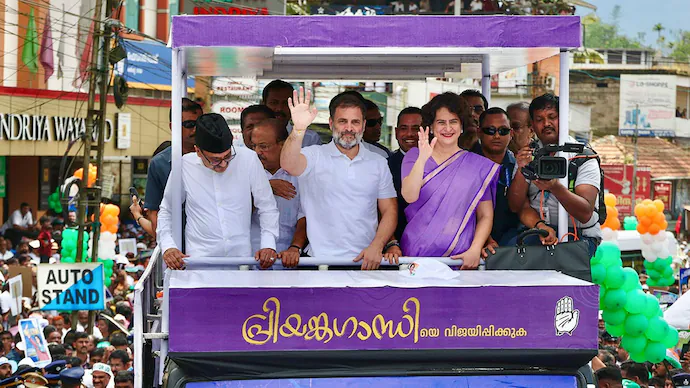
Priyanka Gandhi and internal dynamics in Congress
News in Brief
Priyanka Gandhi Vadra's entry into the Lok Sabha from Wayanad marks a significant shift in the Congress party, continuing the Gandhi family's political legacy. Her victory, with a higher margin than her brother Rahul Gandhi in 2024, strengthens the family's influence within the party. Her strategic skills and leadership could revitalize Congress' campaigns, especially in parliamentary debates. However, her rise also introduces challenges, including potential power struggles within the party and high expectations due to her lineage. This move may lead to a recalibration of roles, with Priyanka playing a key role in the future leadership and strategy of the Congress party, potentially shifting its internal power dynamics.
New Delhi: The political landscape within the Congress party has seen a significant shift with the entry of Priyanka Gandhi Vadra as a Lok Sabha MP from Wayanad, Kerala. This event, occurring after her brother Rahul Gandhi vacated the seat to retain his family bastion in Raebareli, has not only invigorated the party but also set in motion a reevaluation of internal dynamics and power equations.
Priyanka Gandhi Vadra's victory in Wayanad was by no means a surprise, given the strong legacy of the Gandhi family in Indian politics and the loyalty of the constituency to the Congress. Her win, with a substantial margin of 410,931 votes, was slightly higher than Rahul Gandhi's in the 2024 general elections, signaling a continuation of the family's influence in the region. However, her entry into Parliament marks a new chapter, potentially reshaping the party's strategy, leadership, and internal politics.
One immediate impact is the historical presence of three members of the Gandhi family in Parliament simultaneously – Sonia, Rahul, and now Priyanka. This concentration of power within one family has been a perennial point of critique from opposition parties, particularly the BJP, which often frames this as dynastic politics. Within Congress, this could either solidify the family's grip on the party or lead to complexities in decision-making and power distribution.
Priyanka's role as a strategist, her oratory skills, and her command over languages have been highlighted as assets that could benefit the Congress in parliamentary debates and in shaping its public narrative. Her presence is expected to inject fresh energy into the party's campaigns, especially with her track record of managing election strategies in Uttar Pradesh. Her entry could potentially streamline the opposition's approach against the ruling BJP, providing a more unified front in parliamentary proceedings.
However, her parliamentary debut also brings with it challenges. Navigating the intricate web of parliamentary politics while living up to the high expectations set by her lineage will be no small feat. There's a risk that her every move will be scrutinized, not just by political adversaries but also by her own party members eager to see how she handles this new role.
Internally, there could be a recalibration of roles and responsibilities within Congress. Priyanka's active participation might mean adjustments in the party's hierarchy, possibly leading to some tension or realignment among existing leaders. Her visibility could increase the competition for influence within the party, which might either encourage a more vigorous leadership contest or foster unity under her leadership.
Moreover, her presence in the Lok Sabha alongside Rahul could lead to a division of responsibilities, with each potentially focusing on different regional or policy areas. This could be advantageous for the party's broader national strategy, allowing for a more comprehensive representation across India.
Her entry also poses questions about the future leadership of the party. With Sonia Gandhi moving to the Rajya Sabha, and Rahul as the Leader of the Opposition, Priyanka's role might be seen as grooming her for higher positions within the party's structure. This could lead to a subtle power shift, where she might play a more decisive role in party decisions and policy-making.
In conclusion, Priyanka Gandhi Vadra's entry into the Lok Sabha from Wayanad has added a new layer to the Congress party's internal equations. While it promises to bring dynamism and perhaps a new strategic depth, it also challenges the party to manage its internal politics with greater finesse to leverage this familial advantage effectively on the national stage.
Advertise with US
Advertise with US









